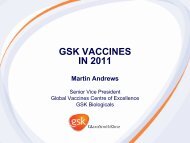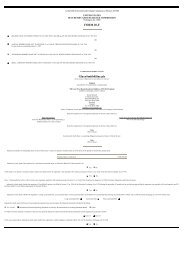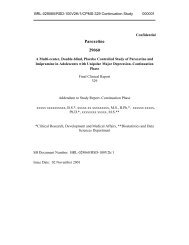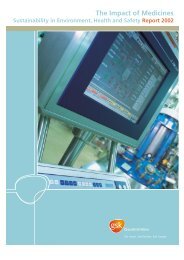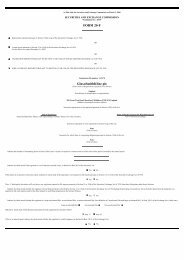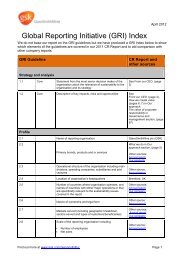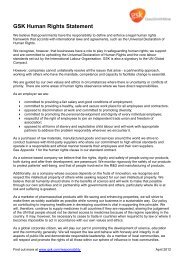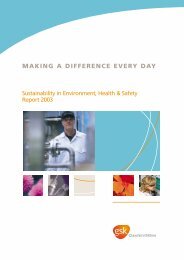GSK Annual Report 2002
GSK Annual Report 2002
GSK Annual Report 2002
Create successful ePaper yourself
Turn your PDF publications into a flip-book with our unique Google optimized e-Paper software.
122 GlaxoSmithKline Notes to the financial statements<br />
37 Reconciliation to US accounting principles<br />
The Financial statements, analyses and reconciliations presented in<br />
this Note represent the financial information which would be<br />
required if US Generally Accepted Accounting Principles (US GAAP)<br />
had been applied instead of UK GAAP.<br />
The most significant difference between US and UK GAAP is that,<br />
under UK GAAP, the combination of Glaxo Wellcome plc and<br />
SmithKline Beecham plc has been accounted for as a merger<br />
(pooling of interest) while under US GAAP this transaction is<br />
accounted for as a purchase business combination with Glaxo<br />
Wellcome acquiring SmithKline Beecham.<br />
GlaxoSmithKline plc was formed to give effect to a Scheme of<br />
Arrangement for the merger of Glaxo Wellcome plc and SmithKline<br />
Beecham plc effective on 27th December 2000. GlaxoSmithKline plc<br />
acquired the whole of the issued share capital of Glaxo Wellcome plc<br />
and SmithKline Beecham plc in exchange for shares in<br />
GlaxoSmithKline plc. Upon completion of the merger the former<br />
shareholders of Glaxo Wellcome held approximately 58.75 per cent<br />
and the former shareholders of SmithKline Beecham held<br />
approximately 41.25 per cent of the issued share capital of<br />
GlaxoSmithKline plc.<br />
As the combination of Glaxo Wellcome and SmithKline Beecham<br />
was accounted for as a merger under UK GAAP, the financial<br />
statements of GlaxoSmithKline under UK GAAP represent the<br />
combined Financial statements of Glaxo Wellcome and SmithKline<br />
Beecham on a historical basis for 2000.<br />
Under US GAAP, this business combination did not qualify for<br />
pooling of interests accounting and Glaxo Wellcome was<br />
determined to be the accounting acquirer in a purchase acquisition<br />
dated 27th December 2000. Under US GAAP the financial<br />
statements of GlaxoSmithKline prior to the merger are therefore<br />
those of Glaxo Wellcome.<br />
In view of the proximity of the merger date to the financial year end<br />
date, and the relative insignificance of any business activity between<br />
27th December 2000 and 31st December 2000, the accounting<br />
date of the acquisition was for practical purposes taken as<br />
31st December 2000.<br />
The reconciliation of the consolidated income statements and the<br />
consolidated statements of comprehensive income and changes in<br />
shareholder equity for the year ended 31st December <strong>2002</strong><br />
correspondingly reflect the purchase method of accounting for<br />
the acquisition of SmithKline Beecham by Glaxo Wellcome. The<br />
income statement has been presented in a US GAAP format and<br />
therefore certain exceptional items under UK GAAP being product<br />
divestments, merger integration costs and, in addition, the write-off<br />
of in-process research and development have been classified within<br />
operating profit.<br />
A consolidated balance sheet and a consolidated statement of cash<br />
flows under US GAAP and in US GAAP format are also presented.<br />
These Financial statements reflect both the purchase method of<br />
accounting for the combination of Glaxo Wellcome and SmithKline<br />
Beecham and also other material adjustments which would be<br />
required if US GAAP had been applied instead of UK GAAP for<br />
the periods presented. A summary of the purchase accounting<br />
adjustments and of other US GAAP adjustments is provided in the<br />
reconciliations of profit attributable to shareholders and of equity<br />
shareholders’ funds from UK to US GAAP.<br />
Summary of material differences between UK and US GAAP<br />
Capitalised interest<br />
Under UK GAAP, the Group does not capitalise interest. US GAAP<br />
requires interest incurred as part of the cost of constructing fixed<br />
assets to be capitalised and amortised over the life of the asset.<br />
Computer software<br />
Under UK GAAP, the Group capitalises costs incurred in acquiring<br />
and developing computer software for internal use where the<br />
software supports a significant business system and the<br />
expenditure leads to the creation of a durable asset. For US GAAP,<br />
the Group applies SOP 98-1 ‘Accounting for the Costs of<br />
Computer Software Developed or Obtained for Internal Use’ which<br />
restricts the categories of costs which can be capitalised.<br />
Goodwill and intangible fixed assets<br />
Under UK GAAP, goodwill arising on acquisitions before 1998,<br />
accounted for under the purchase method, has been eliminated<br />
against shareholders’ funds. Additionally, UK GAAP requires that<br />
on subsequent disposal or closure of a business, any goodwill<br />
previously taken directly to shareholders’ funds is then charged<br />
against income. Beginning in 1998, the Group changed its<br />
accounting policy for goodwill and intangible assets under UK<br />
GAAP in respect of acquisitions from 1998. Under UK GAAP,<br />
goodwill arising on acquisitions from 1998 is capitalised and<br />
amortised over a period not exceeding 20 years.<br />
Under US GAAP, goodwill arising on acquisitions prior to<br />
30 June 2001 was capitalised and amortised over a period not<br />
exceeding 40 years. In July 2001, the FASB issued SFAS 142<br />
‘Goodwill and Other Intangible Assets’. SFAS 142 requires that<br />
goodwill no longer be amortised over its estimated useful life. The<br />
Group must instead identify and value its reporting units for the<br />
purpose of assessing, at least annually, potential impairment of<br />
goodwill allocated to each reporting unit. Additionally, the Group<br />
reassesses the useful lives of existing recognised intangible assets.<br />
Intangible assets deemed to have indefinite lives are no longer<br />
amortised, instead they are tested annually for potential<br />
impairment. Separate intangible assets with finite lives continue to<br />
be amortised over their useful lives.<br />
The Group adopted SFAS 142 as of 1st January <strong>2002</strong>. The<br />
implementation of SFAS 142 resulted in no impairment of the<br />
Group’s goodwill and an initial impairment of £173 million<br />
(£127 million net of tax) on indefinite-lived assets. This is shown as<br />
a cumulative effect of an accounting change.<br />
Under UK GAAP, costs to be incurred in integrating and<br />
restructuring the Wellcome, SmithKline Beecham and Block Drug<br />
businesses following the acquisitions in 1995, 2000 and 2001<br />
respectively were charged to the profit and loss account post<br />
acquisition. Under US GAAP, certain of such costs are considered<br />
in the allocation of purchase consideration thereby affecting the<br />
goodwill arising on acquisition.<br />
Under UK GAAP certain intangible assets related to specific<br />
compounds or products which are purchased from a third party<br />
and are developed for commercial applications are capitalised.<br />
Under US GAAP, payments made for these compounds or products<br />
which are still in development and have not yet received regulatory<br />
approval are charged directly to profit and loss until such time that<br />
they receive regulatory approval.



